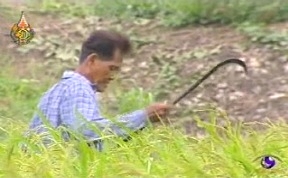Rice farming has long been the mainstay of Thailand. Rice farmers were once dubbed the backbone of the nation. But as a new generation shuns taking over their ancestors’ career, is Thailand’s traditional vocation under threat in the heartland of this once agricultural country?
According to statistics from the Bank for Agriculture and Agricultural Co-operatives (BAAC) in the central province of Ayutthaya, there are some 32,000 registered farmers. The numbers of ‘chao nah’ (people of the rice fields in Thai) is declining in this former seat of Siam’s monarchs, and today most rice farmers do not own the land they work.

Sutin Attanitee has been a rice farmer for his entire life. He’s 72 years old, but still in debt and doesn’t have much land of his own. With his minimal income, he managed to pay his children’s school tuition fees until their graduation. He said he will continue rice farming until he can’t do it any more.
Despite being proud of his own career, Sutin realised his offspring would not want to continue his profession, for they experienced the hardship of their father from hard work, unstable income, and debt.
“Of course, I would want my kids to do what I do. But I don’t think they would. If you have a comfortable job, who would want to be engaged in rice farming? I’ve been doing this my whole life and I still have huge debts,” Sutin said.

The Thai Rice Foundation is under Royal Patronage. Its secretary-general Kwanjai Komes said the problem of the shrinking number of Thai rice farmers has affected the country in many dimensions, such as reduced rice exports and unstable rice prices. Thailand has now lost its ability to compete in rice exports to India and Vietnam. In the future Thailand will also have to import rice from neighbouring countries, she believes.
Kwanjai suggests that the government encourage using new technology in rice farming, create new dimensions, and encourage positive attitudes among rice farmers and the younger generation so they understand that rice farming can be a profitable business and not as difficult as they think.

“We have to create the ability of our rice farmers to compete, or other people will grow rice for us, which they can. This is something the foundation and I are very worried about. We must find measures and solutions to the problem. We have to learn to understand first the impact of this issue, which must be studied thoroughly,” Kwanjai emphasised.
Also expressing a warning to the country, University of Thai Chamber of Commerce (UTCC) Economic and Business Forecasting Center director Dr Thanawat Polwichai recently said he is concerned there will be no more Thai rice farmers in another 10 years.
The average age of Thai rice farmers is currently 50 years old. They can grow rice for another decade, but their children don’t want to continue their parents’ profession. Many rice farmers’ children sell their parents’ land to investors for property development such as housing projects and golf courses.

If the government does not start building stability for rice farming business or for the farmers themselves, the country could also face food security concerns, particularly as rice is the country’s main food.
“If rice farming in Thailand depends more on technology, we can still grow a lot of rice, despite the lower number of the farmers, and food security shouldn’t be an issue. But if the number of the farmers declines considerably along with the number of tracts of land for growing rice, we could risk food security here,” Thanawat said.
The matter is worrying, for Thailand may now be having its last generation of real rice farmers who depend on their labour for a good of quality of life. When worst comes to worst, Thailand’s rice farming business in the future could possibly fall into the hands of foreign investors, and Thai people will only be hired as labour to do the farming.
It is a time for all those concerned to join hands to find immediate solutions to help renew the vocation of rice farming, as well as the well-being of Thai rice farmers so that their smiles will always be part of our Land of Smiles.






